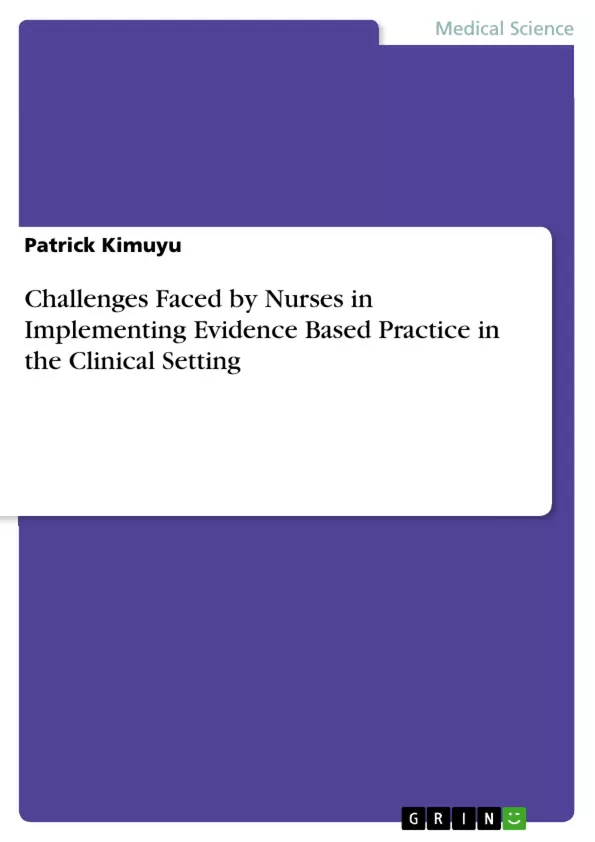Over the past few decades, approaches towards healthcare reforms have been framed within the scope of clinical evidence leading to the emergence of what is commonly referred to as evidence based practice (EBP). EBP is conceptualized as a new clinical decision making approach that is based on diverse aspects of clinical practice including clinical experience, emerging research findings, patient preferences, and expert opinion. This new approach is considered a transformative perspective through which patient outcomes and quality of care can be improved. From a critical perspective, evidence based practice underpins the advancement and development across the continuum of clinical practice.
In the Australian context, healthcare professionals are involved in the assessment and implementation of EBP. However, nurses are expected to play integral roles in implementing EBP in the clinical setting. The Nursing and Midwifery Board of Australia [NMBA] 2016 standards of nursing practice require nurses to adopt evidence based interventions, in order to improve the safety and quality of practice. According to NMBA (2016) standard 1.1; a registered nurses “accesses, analyses, and uses the best available evidence, that includes research findings, for safe, quality practice” (p. 3). Based on this standard of practice, it is expected that nurses are at the forefront of EBP implementation in the clinical setting, yet they do not have relevant training or support.
Therefore, this essay argues that it is not feasible to expect RNs to implement EBP in the clinical setting without training/support.
Inhaltsverzeichnis (Table of Contents)
- Introduction
- Key Aspects of Evidence Based Practice
- How EBP Improves Patient Outcomes
- How EBP is Applied Theoretically and Clinically
- Barriers to the Implementation of Evidence Based Practice
- The Culture of Nursing Practice
- Lack of Independence in Clinical Decision Making
- The Lack of Support from Healthcare Organizations
Zielsetzung und Themenschwerpunkte (Objectives and Key Themes)
This essay examines the challenges faced by nurses in implementing evidence-based practice (EBP) in the clinical setting. The essay argues that despite the importance of EBP in improving patient outcomes and quality of care, nurses in Australia are not adequately trained or supported to implement EBP effectively.
- The Importance of EBP for Patient Outcomes and Quality of Care
- The Role of Nurses in Implementing EBP
- Barriers to EBP Implementation: Cultural Factors, Lack of Independence, and Inadequate Support
- The Need for Training and Support for Nurses in EBP
- The Impact of EBP on Healthcare Resource Utilization
Zusammenfassung der Kapitel (Chapter Summaries)
- Introduction: The introduction establishes the context for the essay by discussing the emergence of evidence-based practice (EBP) as a new approach to clinical decision making. It highlights the importance of EBP in improving patient outcomes and quality of care, particularly within the Australian healthcare system. The essay argues that despite the emphasis on EBP, nurses in Australia lack the necessary training and support to implement it effectively.
- Key Aspects of Evidence Based Practice: This section explores two key aspects of EBP: how it improves patient outcomes and how it is applied theoretically and clinically. It emphasizes the role of EBP in enhancing safe, effective, and efficient care, as well as ensuring appropriate utilization of healthcare resources. Examples are provided to illustrate how EBP can be applied in practice.
- Barriers to the Implementation of Evidence Based Practice: This chapter delves into the challenges nurses face in implementing EBP in the clinical setting. The essay focuses on three primary barriers: the culture of nursing practice, lack of independence in clinical decision making, and the lack of support from healthcare organizations. The author provides evidence to support these points.
Schlüsselwörter (Keywords)
Key terms and topics discussed in this essay include evidence-based practice (EBP), patient outcomes, quality of care, nursing practice, clinical decision making, training and support, cultural factors, independence, healthcare organizations, and resource utilization.
Frequently Asked Questions
What is Evidence Based Practice (EBP) in nursing?
EBP is a clinical decision-making approach that integrates the best available research evidence with clinical expertise, patient preferences, and expert opinion to improve patient outcomes.
What are the main barriers for nurses implementing EBP?
Key barriers include a lack of institutional support, limited time, insufficient training, and a nursing culture that may prioritize traditional practices over new evidence.
What are the NMBA standards regarding EBP in Australia?
The Nursing and Midwifery Board of Australia (2016) requires registered nurses to access, analyze, and use the best available evidence for safe and quality practice.
How does EBP improve patient outcomes?
By using proven interventions and research-backed methods, EBP reduces errors, enhances safety, and ensures that healthcare resources are used efficiently.
Why is training essential for EBP implementation?
Without specific training in research analysis and critical thinking, nurses may find it difficult to translate complex scientific findings into daily clinical actions.
- Citar trabajo
- Patrick Kimuyu (Autor), 2018, Challenges Faced by Nurses in Implementing Evidence Based Practice in the Clinical Setting, Múnich, GRIN Verlag, https://www.grin.com/document/412261



